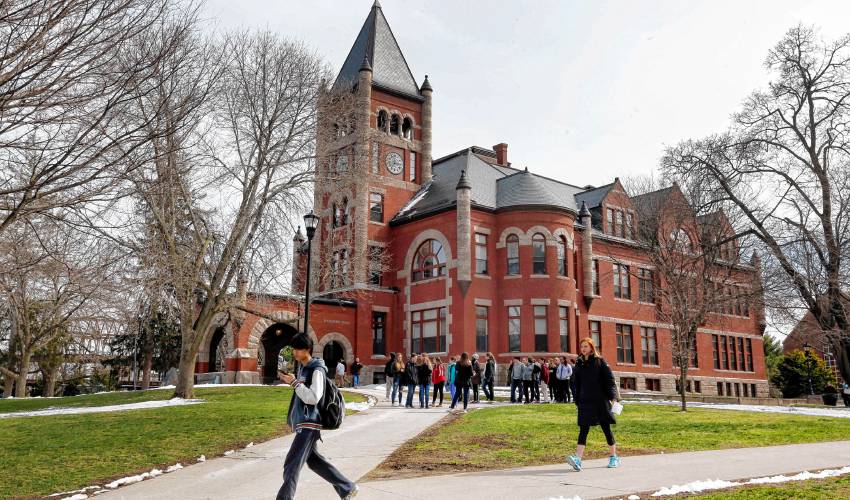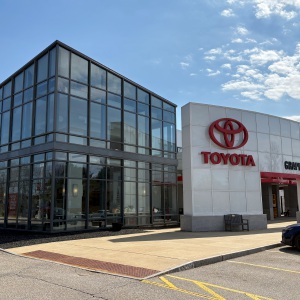Opinion: New Hampshire’s budget crisis is self-inflicted

In this photo taken Wednesday April 6, 2016 students walk past the historic Thompson Hall at the University of New Hampshire in Durham, N.H. (AP Photo/Jim Cole) Jim Cole
| Published: 04-14-2025 8:53 AM |
Todd Selig is the longtime Town Manager in Durham, where he lives with his family.
New Hampshire’s budget crisis isn’t the result of an economic downturn or unexpected calamity — it is the foreseeable outcome of deliberate policy choices.
Chief among those choices is a decade of business tax cuts that have drained state revenues without delivering the promised economic boom.
We were told that cutting the Business Profits Tax (BPT) and Business Enterprise Tax (BET) would attract businesses, grow the economy and create jobs. What we got instead is an underfunded university system, strained schools and counties, struggling low- and moderate-income residents and towns forced to absorb the cost of the state’s growing disinvestment.
Since 2015, reductions in BPT and BET rates have cost New Hampshire between $795 million and $1.17 billion in forgone revenue, according to the New Hampshire Fiscal Policy Institute. And yet, the return on that investment has been negligible.
Let’s look at the facts. From 2015 to 2023, New Hampshire business tax revenues grew 124%. In that same period, Maine and Vermont — states that kept corporate tax rates stable — saw 167% and 166% growth respectively. Nationally, the increase was 192%, and among New England states excluding New Hampshire the increase was 172%.
There has been a minimal economic impact. Each dollar spent on business tax cuts generates only 34 cents in economic activity. In contrast, food assistance yields $1.61, and federal aid to states and municipalities brings in $1.34 per dollar.
Article continues after...
Yesterday's Most Read Articles
 Former superintendent of the year is resigning to become EMT amid rising political attacks on schools
Former superintendent of the year is resigning to become EMT amid rising political attacks on schools
 Unique fiberglass home in Hopkinton is changing hands
Unique fiberglass home in Hopkinton is changing hands
 ‘We honor your death’ – Arranging services for those who die while homeless in Concord
‘We honor your death’ – Arranging services for those who die while homeless in Concord
 Two of five Grappone auto franchises to be sold as part of family transition
Two of five Grappone auto franchises to be sold as part of family transition
 GOP lawmaker wasn’t fired over transgender bathroom comments, business owner says
GOP lawmaker wasn’t fired over transgender bathroom comments, business owner says
 From raising chickens to programming a VR game, Merrimack Valley High School students show off their senior projects
From raising chickens to programming a VR game, Merrimack Valley High School students show off their senior projects
There also hasn’t been a jobs boom. NHFPI analysis shows no statistical link between BPT cuts and job creation. Large corporations — especially multinationals, which make up 60% of BPT revenue — benefit most. Local communities and families are left to absorb the consequences of reduced state investment.
Now, with the New Hampshire House finalizing a two-year budget, proposed cuts reflect the painful consequences of this shortfall.
These aren’t just belt-tightening measures — they’re deep, structural wounds.
Among the most damaging proposals is a 33% cut in state aid to the University System of New Hampshire, a staggering $50 million reduction. Already the least-funded public university system in the nation, USNH plays a vital role in our state’s economic engine. The flagship campus, UNH, generates $1.3 billion in economic output annually, supports nearly 9,000 jobs and contributes over $74 million in state and local tax revenue. UNH alumni alone pump another $1.1 billion into the economy through wages and spending.
But these numbers don’t fully capture what’s at stake. As an R1 research university, UNH attracts $260 million in federal funding each year, tackles critical issues like PFAS contamination and space innovation and sustains over 2,300 jobs. It’s a lifeline to 15,000 students — 19% of whom are first-generation college attendees and many of whom stay and contribute to our workforce after graduation.
Undermining this system now is like a farmer selling their tractor to save on fuel: short-sighted and counterproductive.
The proposed budget also freezes Rooms and Meals Tax distributions to municipalities at $137 million per year. This amounts to a de facto $11 million cut over two years. For cities and towns like Durham, Concord, Hooksett and Manchester, it means raising property taxes or cutting services, another example of the state offloading its responsibilities onto local governments and local taxpayers.
We need solutions rooted in pragmatism, not ideology. One step lawmakers could take now would be to restore business tax rates. Reinstating pre-2015 BPT and BET rates could generate up to $1 billion in revenue — funds that could stabilize USNH, restore municipal aid and support key services like Medicaid expansion and the arts.
Lawmakers could also pause new spending. Delay all new programs and initiatives unless they demonstrate clear cost savings, improved efficiencies or long-term economic benefit. The Governor’s Commission on Government Efficiency could play a leading role in identifying these opportunities.
New Hampshire residents pride themselves on common-sense decision-making. We invest in what works, fix what’s broken and pivot when policies fall short.
The business tax cuts have not delivered. Clinging to them out of political convenience only prolongs the damage.
This budget crisis is not inevitable. It’s the direct result of legislative choices made over the last decade. Lawmakers must now choose differently for the sake of our communities, our students and our shared future.







 Opinion: The uniqueness of American imperialism
Opinion: The uniqueness of American imperialism Opinion: The Declaration of Independence is the antidote to Project 2025
Opinion: The Declaration of Independence is the antidote to Project 2025
